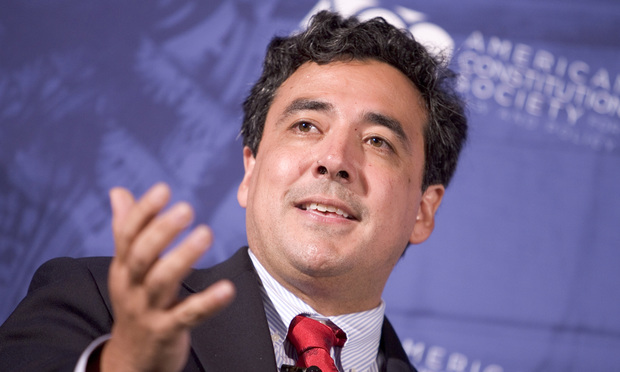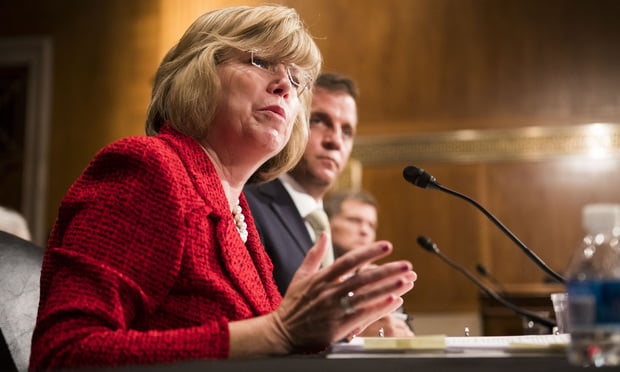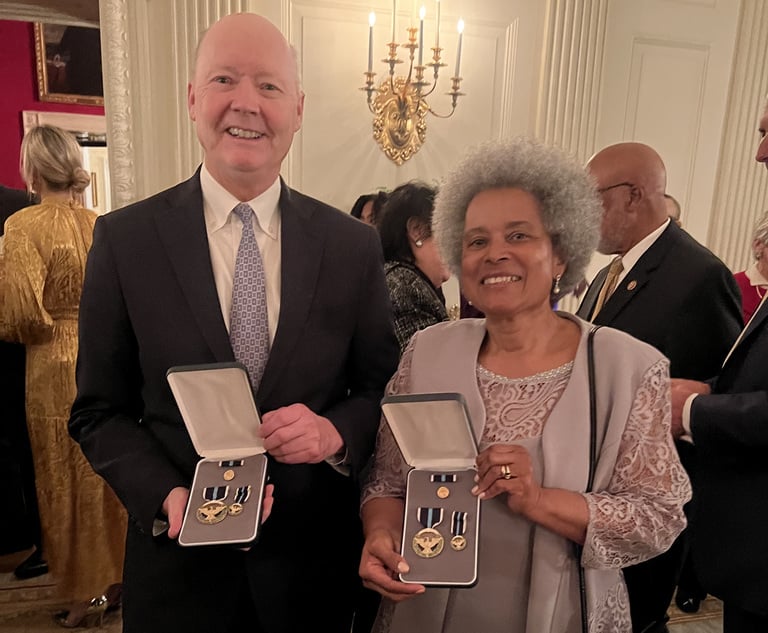Justice Dept. Takes Stance Against Transgender Rights—and the EEOC—in Supreme Court
No EEOC lawyers signed the Justice Department's brief Wednesday that said federal civil rights laws don't protect against gender-identity discrimination in the workplace.
October 24, 2018 at 05:14 PM
6 minute read
The original version of this story was published on National Law Journal
 U.S. Solicitor General Noel Francisco. Credit: Diego M. Radzinschi/ ALM
U.S. Solicitor General Noel Francisco. Credit: Diego M. Radzinschi/ ALM
The U.S. Justice Department told the U.S. Supreme Court on Wednesday that transgender workers are not guaranteed federal anti-discrimination protections, arguing against the views of the U.S. Equal Opportunity Commission and marking the latest clash between the agencies over the scope of Title VII civil rights.
The EEOC, which has pushed for broader interpretation of sex discrimination under Title VII, brought the lawsuit against a Michigan funeral home after it fired transgender employee Aimee Stephens. The U.S. Court of Appeals for the Sixth Circuit ruled in March that the funeral home unlawfully fired Stephens.
The Justice Department represents the EEOC in matters before the Supreme Court. The brief filed Wednesday by U.S. Solicitor General Noel Francisco, in the case R.G. & G.R. Harris Funeral Home v. EEOC, did not include any EEOC lawyers on the cover sheet, one sign of the conflict between the agencies. The EEOC declined to comment.
The Justice Department's position was not a surprise, as the agency, under the leadership of U.S. Attorney General Jeff Sessions, has argued in trial and appeals courts against protections for both gender identity and sexual orientation under Title VII of the Civil Rights Act. Last year, the Justice Department, lining up against the EEOC, told the U.S. Court of Appeals for the Second Circuit that federal civil rights protections do not extend to gay and lesbian employees.
Justice Department lawyers said Wednesday they disagree with the Sixth Circuit's ruling that the funeral home violated federal discrimination laws by firing Stephens on the basis of gender identity. Stephens is represented in the Supreme Court by the American Civil Liberties Union.
“The court's further conclusion that gender-identity discrimination necessarily constitutes discrimination because of sex in violation of Title VII—although it was unnecessary to the ultimate result the court reached in this case—is also inconsistent with the statute's text and this Court's precedent,” Francisco wrote in the Justice Department's brief.
The Justice Department hedged in its brief on whether the court should take up the case. Francisco argued the Supreme Court should only take up the case if it decides to take up two other cases pending before the court that raise a similar but distinct question about sexual orientation protections.
Those two cases—arising from the Second and Eleventh circuits—focus on whether Title VII protects against sexual orientation discrimination. At least five appeals courts have said gender identity should be protected under federal civil rights law. The appeals courts are divided on sexual orientation protections.
The Second Circuit ruled in Zarda v. Altitude Express that Title VII should include sexual orientation protections. The Second Circuit aligned with the Seventh Circuit's decision last year in Hively v. Ivy Tech Community College. The Eleventh Circuit ruled against such an interpretation in Bostock v. Clayton County Board of Commissioners.
“The question presented in Zarda and Bostock implicates a much deeper and more entrenched circuit conflict on a similarly important and recurring question that nearly every circuit has addressed, and two courts of appeals sitting en banc have recently rejected the long-prevailing consensus view on that question,” Francisco wrote in Wednesday's Supreme Court brief.
Francisco said the question presented “in those cases is distinct from the issues petitioner raises here, but analysis of the issues may overlap.”
Employers embrace broader protections
The legal definition of sex discrimination under Title VII has evolved over the decades to include sex stereotyping and harassment, among other protections. More states have passed anti-discrimination laws that protect LGBT workers.
The EEOC and civil rights advocates in recent years have pushed for a broader interpretation of Title VII to include sexual orientation and gender identity as forms of “sex discrimination.” The agency, tasked with enforcing those civil rights laws, have tackled thousands of cases on behalf of LGBT workers since it adopted a new position in 2013.
The Trump-era EEOC hasn't abandoned positions taken during the Obama administration on transgender, gay and lesbian rights. The five-member EEOC currently has three members, and two are Democrats. The commission is awaiting the confirmation of Janet Dhillon, former general counsel to Burlington Stores, and Daniel Gade, a West Point professor.
 EEOC nominees Janet Dhillon and Daniel Gade at their confirmation hearing in September in Washington. Credit: Diego M. Radzinschi/ ALM
EEOC nominees Janet Dhillon and Daniel Gade at their confirmation hearing in September in Washington. Credit: Diego M. Radzinschi/ ALMSessions in October reversed Obama-era guidance concerning transgender protections. The memo said “Title VII's prohibition on sex discrimination encompasses discrimination between men and women but does not encompass discrimination based on gender identity.” The government said it would take that position “in all pending and future matters.”
On Wednesday, ACLU attorney John Knight urged the court to decline to take up the case, arguing that the dispute is the wrong vehicle for the justices to look at the scope of Title VII protections. The Stephens case, the ACLU said, focuses on sex stereotyping, a protection settled by a previous Supreme Court ruling.
“The circuit courts have uniformly agreed that all people, including those who are transgender, may bring sex discrimination claims under Title VII if their employers discriminate against them because of sex stereotypes related to behavior and appearance,” Knight wrote.
When it comes to corporate America, the trend appears more toward broader inclusion and protections. In a recent report sponsored by Bloomberg Law, Seyfarth Shaw management-side partners Sam Schwartz-Fenwick and Ben Conley said they advised companies to craft policies to help transgender workers. State governments have also passed laws that include anti-discrimination protections for gay and transgender workers.
“Employers are increasingly putting in place proactive policies to ensure that their transgender employees feel safe and welcome in the workplace,” the Seyfarth lawyers wrote.
The Justice Department's brief in R.G. & G.R. Harris Funeral Homes v. EEOC:
Read more:
LGBT Workplace Cases Arrive at SCOTUS as Kennedy Punches Out
New Case at US Supreme Court Tests Gender Pay Disparities
US Justice Department Opens New Front Against EEOC
Lessons From Estée Lauder's Parental Leave Settlement With EEOC
Trump Administration Lines Up Against EEOC in LGBT Workplace Rights Case
This content has been archived. It is available through our partners, LexisNexis® and Bloomberg Law.
To view this content, please continue to their sites.
Not a Lexis Subscriber?
Subscribe Now
Not a Bloomberg Law Subscriber?
Subscribe Now
NOT FOR REPRINT
© 2025 ALM Global, LLC, All Rights Reserved. Request academic re-use from www.copyright.com. All other uses, submit a request to [email protected]. For more information visit Asset & Logo Licensing.
You Might Like
View All
The Gospel According to Paxton? AG Fights Religious Group Over Migrants
6 minute read
Attorney Sanctioned $9K for Revealing Nude Photos, Other Info in Court Filing
4 minute read
Family's Disability Discrimination Suit Cleared to Go Forward Against Six Flags
5 minute read
Delaware Legal Figures Who Played Key Roles in Ending School Segregation Honored With Presidential Citizens Medal
3 minute readTrending Stories
- 1Courts Grapple With The Corporate Transparency Act
- 2FTC Chair Lina Khan Sues John Deere Over 'Right to Repair,' Infuriates Successor
- 3‘Facebook’s Descent Into Toxic Masculinity’ Prompts Stanford Professor to Drop Meta as Client
- 4Pa. Superior Court: Sorority's Interview Notes Not Shielded From Discovery in Lawsuit Over Student's Death
- 5Kraken’s Chief Legal Officer Exits, Eyes Role in Trump Administration
Who Got The Work
J. Brugh Lower of Gibbons has entered an appearance for industrial equipment supplier Devco Corporation in a pending trademark infringement lawsuit. The suit, accusing the defendant of selling knock-off Graco products, was filed Dec. 18 in New Jersey District Court by Rivkin Radler on behalf of Graco Inc. and Graco Minnesota. The case, assigned to U.S. District Judge Zahid N. Quraishi, is 3:24-cv-11294, Graco Inc. et al v. Devco Corporation.
Who Got The Work
Rebecca Maller-Stein and Kent A. Yalowitz of Arnold & Porter Kaye Scholer have entered their appearances for Hanaco Venture Capital and its executives, Lior Prosor and David Frankel, in a pending securities lawsuit. The action, filed on Dec. 24 in New York Southern District Court by Zell, Aron & Co. on behalf of Goldeneye Advisors, accuses the defendants of negligently and fraudulently managing the plaintiff's $1 million investment. The case, assigned to U.S. District Judge Vernon S. Broderick, is 1:24-cv-09918, Goldeneye Advisors, LLC v. Hanaco Venture Capital, Ltd. et al.
Who Got The Work
Attorneys from A&O Shearman has stepped in as defense counsel for Toronto-Dominion Bank and other defendants in a pending securities class action. The suit, filed Dec. 11 in New York Southern District Court by Bleichmar Fonti & Auld, accuses the defendants of concealing the bank's 'pervasive' deficiencies in regards to its compliance with the Bank Secrecy Act and the quality of its anti-money laundering controls. The case, assigned to U.S. District Judge Arun Subramanian, is 1:24-cv-09445, Gonzalez v. The Toronto-Dominion Bank et al.
Who Got The Work
Crown Castle International, a Pennsylvania company providing shared communications infrastructure, has turned to Luke D. Wolf of Gordon Rees Scully Mansukhani to fend off a pending breach-of-contract lawsuit. The court action, filed Nov. 25 in Michigan Eastern District Court by Hooper Hathaway PC on behalf of The Town Residences LLC, accuses Crown Castle of failing to transfer approximately $30,000 in utility payments from T-Mobile in breach of a roof-top lease and assignment agreement. The case, assigned to U.S. District Judge Susan K. Declercq, is 2:24-cv-13131, The Town Residences LLC v. T-Mobile US, Inc. et al.
Who Got The Work
Wilfred P. Coronato and Daniel M. Schwartz of McCarter & English have stepped in as defense counsel to Electrolux Home Products Inc. in a pending product liability lawsuit. The court action, filed Nov. 26 in New York Eastern District Court by Poulos Lopiccolo PC and Nagel Rice LLP on behalf of David Stern, alleges that the defendant's refrigerators’ drawers and shelving repeatedly break and fall apart within months after purchase. The case, assigned to U.S. District Judge Joan M. Azrack, is 2:24-cv-08204, Stern v. Electrolux Home Products, Inc.
Featured Firms
Law Offices of Gary Martin Hays & Associates, P.C.
(470) 294-1674
Law Offices of Mark E. Salomone
(857) 444-6468
Smith & Hassler
(713) 739-1250








